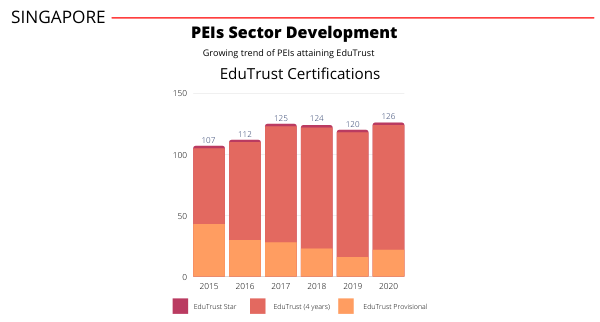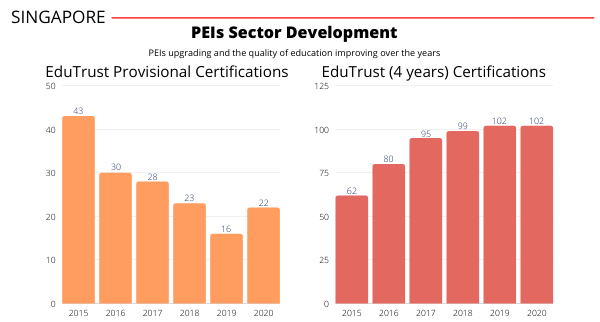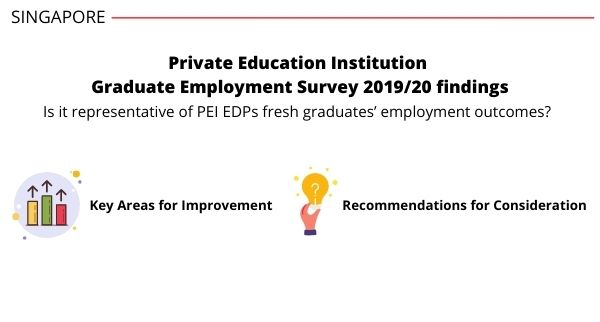In our previous articles, Is EduTrust difficult to attain? and Singapore: 15 PEIs downgraded or lost their EduTrust Certifications in the last 17 months, we described the EduTrust Certification processes, explained the difference between ERF and EduTrust as well as introduced misconceptions Private Education Institutes (PEIs) face with EduTrust. Since EduValue (EV) directly handles EduTrust, ERF and QA consulting for more than 30 applications a year, I spoke with a couple of our experienced EV team leads to gain a better on-the-ground understanding of how these misconceptions came about and how PEIs and private schools can go about the EduTrust process with greater understanding and with more efficiency.
Misconception that PEIs need to be profitable and resource rich to attain EduTrust Certification
The team leads agree that a common and prevalent misconception that PEIs have about attaining the EduTrust certification is that they must be a large profitable PEI with lots of resources. Our team leads downplay its importance as they have seen varied results based on a PEI’s size and resource capabilities. For instance, they have seen large PEIs invest so much into their EduTrust applications only to receive a 1-year EduTrust certification. They have also seen small PEIs with only two or three staff attain the 4-years EduTrust. So, what are the challenges and obstacles that PEIs face when undertaking their EduTrust applications?
Challenges PEIs face on-the-ground that hinder their EduTrust application processes
Overall, our team leads sum it up to PEIs management struggling to conduct regular monitoring of the different requirements stipulated by the EduTrust certification. This then snowballs and there is a tendency for PEIs to miss out crucial requirements later on such as the critical timelines of FPS. However, they point out that these issues are only the tip of the iceberg and there are more challenges and obstacles PEIs face that impact their capability and capacity to successfully apply or renew their EduTrust certification.
1. Lack of training and resources to guide PEIs and private schools in the EduTrust processes
Currently, PEIs are only equipped with the guidance document (latest one being GD3) and best practices sessions conducted by the regulatory board, the Committee for Private Education (CPE). There are some requirements that are not stipulated in the guidance document but are assumed to be necessary. This can be quite confusing for PEIs who strictly follow the requirements in the guidance document. As such, the inadequate preparation on the EduTrust Certification and lack of clarity and resources on the EduTrust process leave many PEIs struggling to juggle between their business needs and keep up with the necessary paperwork and procedures to ensure their EduTrust certification. As a result, many either accept being downgraded or turn to consultants as a last-ditch effort to boost their chances of a successful renewal.
The lack of adequate training and resources for PEIs are especially evident when we see the industry taking strides forward but many PEIs are still stuck in the past. From 2020 to April 2021, we have seen 15 PEIs that were downgraded, lost their EduTrust or were deregistered. The PEIs that were affected were doing the same as what they did 4 years ago when they attained the 4-Years EduTrust Certification as they were not up-to-date on the regulatory requirements and expectations. These PEIs forget that while their EduTrust certification is valid, CPE, the regulator, evolves over time, making improvements and changes to how PEIs are assessed. We do not see these issues as much in PEIs that have 1-year EduTrust as they are reviewed by CPE every 8 months and are kept relatively up-to-date with the regulatory standards. PEIs that have 4-year EduTrust certification tend to be more outdated as they are only reviewed by CPE once every 2 years. The guided interim that is conducted only cover 5 areas so the PEIs might be up-to-date in these areas but not in other areas. These PEIs were not aware of how the benchmarks have changed and were unable to keep up with industry standards. EV and our team leads believe that this could be due to the fact that the PEIs do not have the network and social interaction to liaise with other PEIs and share best practices on their business, QA and EduTrust knowledge that could keep them abreast with the latest EduTrust processes.
2. Management dictates a PEI’s mindset towards the EduTrust process
It is important for PEIs management to understand and champion for EduTrust process as their mindset and attitude can influence their staff and the PEI’s ability to apply or renew their EduTrust certification. When PEIs management and their team regard EduTrust as unimportant, they become disorganised and messy which makes their entire EduTrust process more difficult.
PEIs management has the responsibility of ensuring that their staff are informed and aware of actions that could impact the PEI’s EduTrust applications. Our team leads noticed that PEIs that successfully renew their EduTrust certification tend to have a dedicated staff or department who liaises with all other departments on the necessary EduTrust matters and documentation. Similarly, weaker PEIs who either downgraded or were unsuccessful in the EduTrust application did not have a person or department taking charge of the EduTrust process.
3. PEIs’ priorities and delegation of the EduTrust application workload
While EduTrust is a crucial certification that will dictate a PEI’s business strategies, PEIs tend to prioritise day-to-day operations that require their immediate attention over a lengthy regulatory process that is less urgent in the moment. In order to understand what affects a PEI’s capability and capacity to successfully attain their EduTrust certification, one must understand how a PEI’s size can affect their priorities in day-to-day operations and the delegation of the EduTrust application workload.
We have notice that small PEIs tend to be caught up in day-to-day operations, sales, student services, etc. to ensure that their business is profitable. As a result, they tend to push EduTrust paperwork to the end and this can create backlog or issues when there are staff turnovers and resignations. On the other hand, bigger PEIs often have only a few people in top management involved in the EduTrust applications. This creates a disconnect when people from other levels of management make changes on the ground to make day-to-day operations more efficient but unknowingly affect the EduTrust applications. While these changes may be deemed as unimportant to raise up the chain of command, they can significantly impact the PEI’s ability to provide coherent documentation of its processes in the EduTrust applications.
Additionally, when you throw in COVID-19 to the mix, business needs are very dynamic and operations have to be pivoted in quick turnovers. Many PEIs have to shuffle between in-person classes and online learning, some even moving fully to offshore delivery. With so much that needs to be done on the ground whether it is attending to lecturers and students or executing business continuity strategies, EduTrust paperwork quickly falls down the list of priorities and are put on the backburner. Ultimately, the EduTrust Certification puts PEIs at a constant dilemma as there is a disconnect between holding PEIs to high standards while PEIs strive to secure their business needs and regulatory requirements without proper, sufficient and timely training on the EduTrust process.
4. Staff turnover
Management and staff turnover without proper handover during an EduTrust process can be detrimental to a PEI’s ability to successfully receive the certification. When there is a sudden shift in top management that manages EduTrust matters without proper handover, crucial knowledge on EduTrust and QA will be lost and can significantly hinder the PEI’s EduTrust applications. Moreover, it is commonplace for small PEIs where staff have to wear multiple hats across multiple job functions – including EduTrust – to experience staff turnovers. This is because of the sheer amount of paperwork needed to be generated for EduTrust applications is an arduous and tedious process. These PEIs need to ensure and minimise significant losses to their knowledge of EduTrust and QA. Therefore, it is important for PEIs to ensure that they are able to retain as much knowledge of EduTrust even after staff turnover so that they are still able to attain the EduTrust certifications and reduce risks of downgrading or being stripped of the certification.
Moving forward
The imperative first step to going about EduTrust applications more efficiently is that PEIs need to evaluate and address the challenges that we have highlighted that is within their control. Additionally, appointing a key department or person-in-charge of the EduTrust process who conducts regular monitoring of the different requirements and deadlines, and liaises with the relevant departments and staff for the necessary documents, would keep the PEIs up-to-date with their EduTrust process. This greatly reduces the risks of being caught off-guard or scrambling to meet changes in requirements while increasing the likelihood of a successful EduTrust Certification.
If you face similar issues to those mentioned above, do not hesitate to contact us and we could have a discussion about how best to reduce your risk of a EduTrust downgrade.
Written and graphic design by Gillian Koh, Industry Research Team at EduValue





